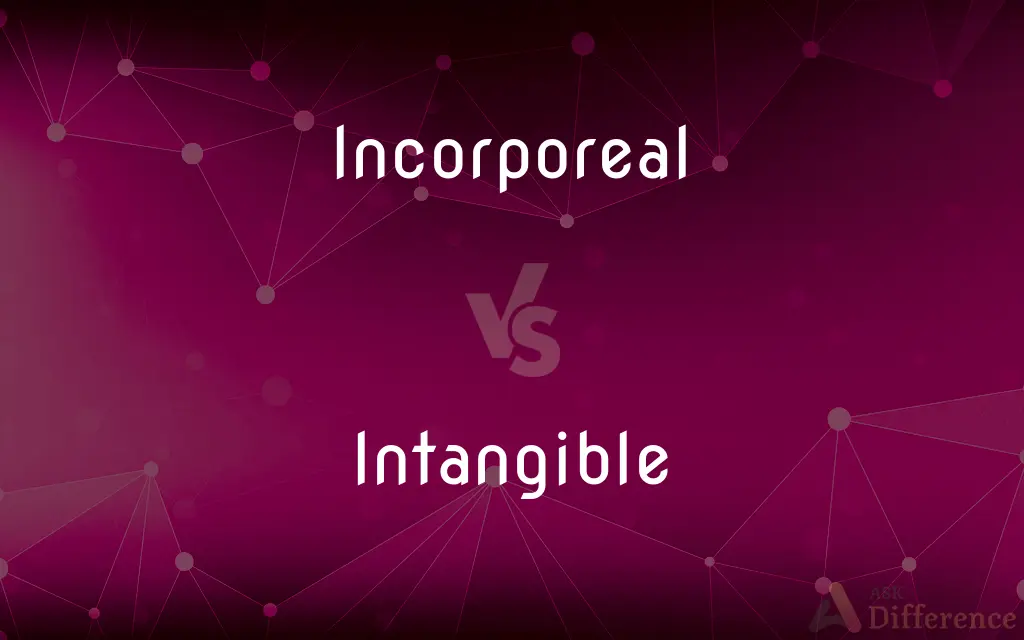Incorporeal vs. Intangible — What's the Difference?
By Fiza Rafique & Urooj Arif — Updated on May 9, 2024
Incorporeal refers to something lacking a physical body or form, often used in legal or philosophical contexts. Intangible describes something that cannot be touched or easily defined but may have abstract value or significance.

Difference Between Incorporeal and Intangible
Table of Contents
ADVERTISEMENT
Key Differences
Incorporeal signifies a lack of a physical body or form, often associated with legal rights or spiritual entities. Intangible, on the other hand, describes items or qualities that don't have a clear, tangible existence but can still have significance or value.
Incorporeal is used to discuss abstract legal rights, such as copyrights or easements, and in philosophical contexts like spirits or souls. Intangible includes concepts like goodwill, reputation, and intellectual property that hold value but aren't directly perceptible.
Incorporeal items are not physically embodied, like a ghost or legal right, whereas intangible assets include valuable but non-physical qualities, like trademarks or brand reputation.
Incorporeal is generally more specific to something not tied to physical substance, while intangible encompasses a broader range of abstract qualities and concepts.
Comparison Chart
Definition
Lacking physical form
Not touchable, abstract value
ADVERTISEMENT
Usage
Legal, spiritual, philosophical
Business, intellectual, emotional
Examples
Legal rights, spirits, souls
Goodwill, intellectual property
Value
Often abstract or spiritual
Often measured in business terms
Application
Legal documents, religious texts
Branding, financial statements
Compare with Definitions
Incorporeal
Lacking physical form or substance.
The ghost was believed to be an incorporeal entity.
Intangible
Not touchable or perceivable by the senses.
The company valued its brand's intangible goodwill highly.
Incorporeal
Legal rights without physical embodiment.
Copyrights are an example of incorporeal property rights.
Intangible
Relating to abstract concepts like innovation.
Innovation is an intangible factor that drives business success.
Incorporeal
Philosophical idea of immaterial existence.
Some philosophies describe the soul as incorporeal.
Intangible
Emotion or sentiment that cannot be measured.
Friendship is an intangible but important aspect of life.
Incorporeal
Metaphysical and beyond direct observation.
The concept of consciousness has often been thought of as incorporeal.
Intangible
Valuable yet abstract property.
Patents and trademarks are considered intangible assets.
Incorporeal
Spiritual beings not bound by physical form.
The angel appeared incorporeal but radiated light.
Intangible
Qualities that enhance something's value.
The artist's style added an intangible charm to the painting.
Incorporeal
Lacking material form or substance.
Intangible
Incapable of being perceived by the senses.
Incorporeal
(Law) Of or relating to property or an asset that cannot be physically possessed, as a right or patent.
Intangible
Incapable of being realized or defined.
Incorporeal
Having no material form or physical substance.
Intangible
Incorporeal.
Incorporeal
(legal) Relating to an asset that does not have a material form; such as a patent.
Intangible
Something intangible
The athlete owed his success not only to strength and speed but also to intangibles such as perseverance and dedication.
Incorporeal
Not corporeal; not having a material body or form; not consisting of matter; immaterial.
Thus incorporeal spirits to smaller formsReduced their shapes immense.
Sense and perception must necessarily proceed from some incorporeal substance within us.
Intangible
An asset that cannot be perceived by the senses, such as intellectual property or goodwill.
Incorporeal
Existing only in contemplation of law; not capable of actual visible seizin or possession; not being an object of sense; intangible; - opposed to corporeal.
Intangible
(Law) Incorporeal property such as bank deposits, stocks, bonds, and promissory notes
A state tax on intangibles.
Incorporeal
Without material form or substance;
An incorporeal spirit
Intangible
Incapable of being perceived by the senses; incorporeal.
Intangible
Anything intangible
Intangible
(legal) Incorporeal property that is saleable though not material, such as bank deposits, stocks, bonds, and promissory notes
Intangible
Not tangible; incapable of being touched; not perceptible to the touch; impalpable; imperceptible.
A corporation is an artificial, invisible, intangible being.
Intangible
Assets that are saleable though not material or physical
Intangible
(of especially business assets) not having physical substance or intrinsic productive value;
Intangible assets such as good will
Intangible
Incapable of being perceived by the senses especially the sense of touch;
The intangible constituent of energy
Intangible
Hard to pin down or identify;
An intangible feeling of impending disaster
Intangible
Lacking substance or reality; incapable of being touched or seen;
That intangible thing--the soul
Common Curiosities
How is intangible used in business?
Intangible is used to describe valuable business assets that aren't physically touchable, such as trademarks and brand value.
What are some examples of intangible assets?
Intangible assets include intellectual property, goodwill, brand reputation, and software.
What does incorporeal mean in legal terms?
Incorporeal refers to rights or property that don't have a physical presence, like copyrights or easements.
Can incorporeal refer to spiritual concepts?
Yes, incorporeal is often used in spiritual or metaphysical contexts to describe entities like ghosts or souls.
Is goodwill an intangible asset?
Yes, goodwill is an intangible asset that reflects the value of a company's reputation and customer relationships.
Does incorporeal have a direct physical presence?
No, incorporeal items lack direct physical presence, often existing only as concepts or legal rights.
What are incorporeal rights?
Incorporeal rights include intellectual property, easements, and other non-physical legal claims.
Is an incorporeal asset a physical asset?
No, incorporeal assets exist without physical form and typically include legal rights or abstract concepts.
Does incorporeal mean imaginary?
Not necessarily. Incorporeal often means lacking physical form but can refer to legally recognized rights or spiritual beliefs.
How does intangible differ from physical assets?
Intangible assets aren't directly perceivable or measurable by touch, while physical assets have a clear material form.
Can something be both incorporeal and intangible?
Yes, incorporeal rights like copyrights are also intangible because they hold abstract value.
What intangible qualities do businesses value?
Businesses often value intangible qualities like customer loyalty, brand image, and intellectual property.
How is goodwill assessed as an intangible?
Goodwill is assessed based on the business's overall reputation and customer loyalty, adding value beyond its physical assets.
Why are intangible assets important in modern businesses?
Intangible assets like intellectual property and brand reputation are crucial for competitiveness and market differentiation.
Are incorporeal items always spiritual in nature?
No, incorporeal items include legal rights like patents that aren't spiritual but lack physical form.
Share Your Discovery

Previous Comparison
Endorsement vs. Approval
Next Comparison
Based vs. FoundedAuthor Spotlight
Written by
Fiza RafiqueFiza Rafique is a skilled content writer at AskDifference.com, where she meticulously refines and enhances written pieces. Drawing from her vast editorial expertise, Fiza ensures clarity, accuracy, and precision in every article. Passionate about language, she continually seeks to elevate the quality of content for readers worldwide.
Co-written by
Urooj ArifUrooj is a skilled content writer at Ask Difference, known for her exceptional ability to simplify complex topics into engaging and informative content. With a passion for research and a flair for clear, concise writing, she consistently delivers articles that resonate with our diverse audience.
















































